Created in 2008, the Women and Infant’s Health Specimen Consortium (WIHSC) at Washington University School of Medicine assists researchers by offering a collection of high-quality data and biospecimens from pregnant women and their infants.
The brainchild of Washington University scientist Ann Gronowski, PhD, WIHSC grew out of her research interests in the biochemical markers of pregnancy. Because Gronowski’s lab studied the markers of preterm delivery, fetal lung maturity and ectopic pregnancy, she saw the need for specimens that were obtained before the onset of symptoms. As a result, and unlike other repositories, WIHSC collects specimens and patient medical data longitudinally, from preconception throughout gestation from the mother and after delivery from the infant. These mother-infant sets of data are recorded, stored and made available to investigators.

“Because WIHSC specimens are collected from women prior to pregnancy, we can make associations between preconception health and lifestyle, and subsequent outcomes during pregnancy and postpartum,” says Emily Jungheim, MD, assistant professor of obstetrics and gynecology and women’s reproductive health research scholar in the Division of Reproductive Endocrinology and Infertility at Washington University. Jungheim is investigating the influence of lifestyle and diet on reproductive health in women undergoing fertility treatments. Her hope is that specimens collected through WIHSC will reveal lifestyle modifications that may improve outcomes for previously infertile women.
Data and specimens collected by WIHSC are available to all researchers. The consortium currently operates under the direction of Gronowski, Kelle Moley, MD, and Marwan Shinawi, MD, Washington University physicians at Barnes-Jewish Hospital. Moley, says Gronowski, was instrumental in the founding of the consortium. From the beginning, Gronowski and Moley were committed to establishing a large bank of specimens collected from all stages of pregnancy.
In fact, the two women’s complementary skill sets played a significant role in the foundation of WIHSC and its ongoing success. Thanks to her practice in obstetrics and gynecology, Moley had connections to physicians in those fields and understood what was needed to achieve patient enrollment. Gronowski’s research in the field of pathology gave her particular insight into the collection and storage of specimens.
With funding from the Institute of Clinical and Translational Science and the Children’s Discovery Group, Moley and Gronowski were able to begin collecting specimens from a small population of patients seen by the Reproductive Endocrinology and Infertility Clinic at Washington University. Specimen recruitment then expanded to include the Center for Advanced Medicine, Women’s Health Clinic and Labor and Delivery. Samples are now collected at preconception and throughout each trimester of pregnancy during a patient’s medical appointments; infant and delivery specimens are collected through the Labor and Delivery department.
“WIHSC is everything we had hoped and more,” says Moley. “As a result of its infrastructure and the services we offer, researchers from within the Washington University community have come to us for help in designing their studies. We are extremely pleased that we have facilitated so many projects in women and infant health.” WIHSC is unusual in its ability to offer researchers access to its biospecimen bank without requiring specimen deposits to replace ones that are retrieved. Because it collects and processes new samples daily, the repository’s reserves are never depleted.
The staff of the consortium not only obtains patient consent and collects, processes and stores specimens, it also assists researchers in selecting and obtaining previously banked specimens based on a comprehensive database of outcomes data.
Since its inception, WIHSC has significantly changed the landscape of translational research in women and infant health at Washington University, providing resources to the departments of pathology, pediatrics, and obstetrics and gynecology, and supporting research in areas not historically connected with reproduction, including the departments of anesthesiology, social work, molecular microbiology, developmental biology and internal medicine, and the Washington University Brown School of Social Work. The consortium has supported research in a wide variety of women’s health issues, including infertility, pre-eclampsia, recurrent pregnancy loss and preterm delivery, as well as gynecologic pathologies such as endometriosis and sexually transmitted infections.
All studies using WIHSC data must be approved by the Washington University Institutional Review Board. Those who wish to use WIHSC data must have the objective of studying clinically important women and infant health issues related to maternal-fetal medicine, pregnancy or pediatric diseases.
For more information about WIHSC, visit research.wustl.edu/core-facilities/wihsc/.